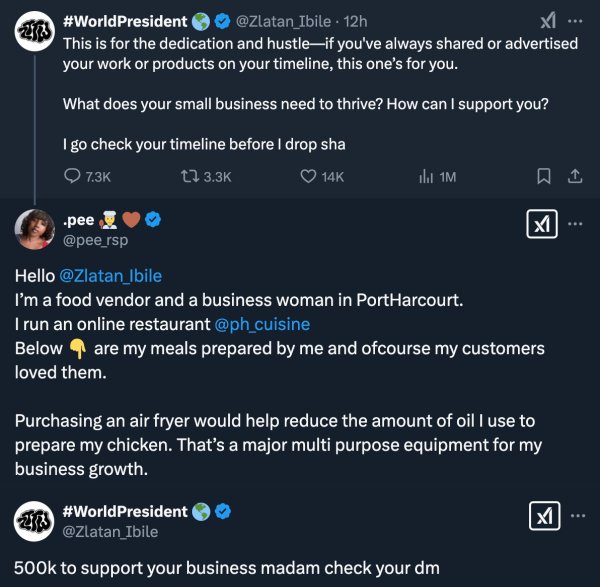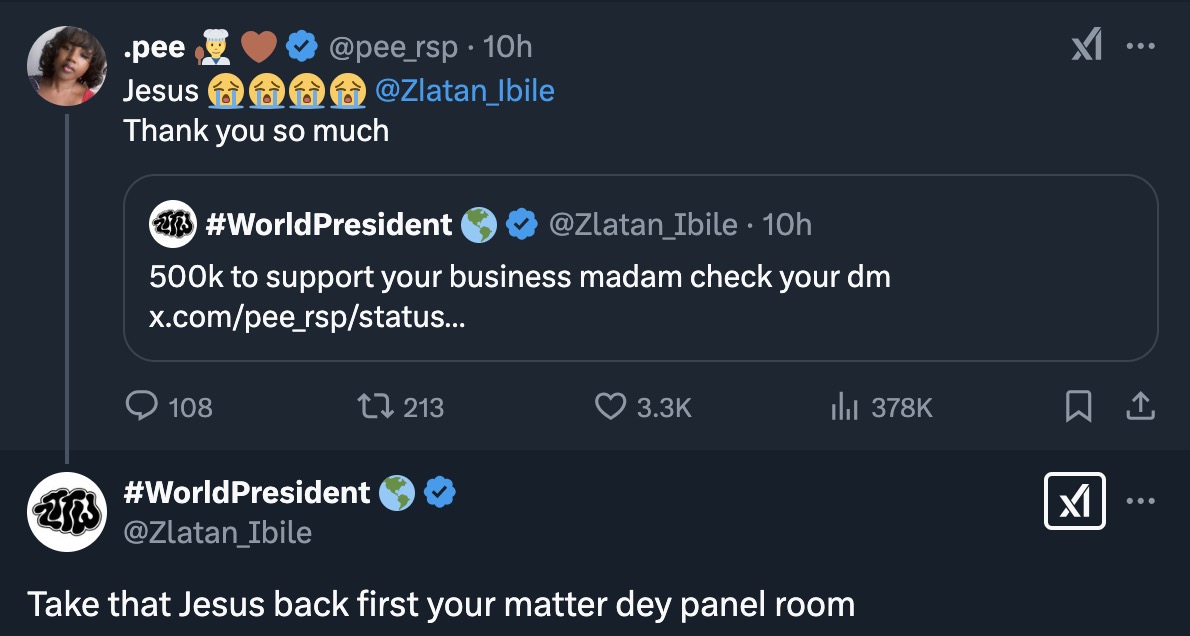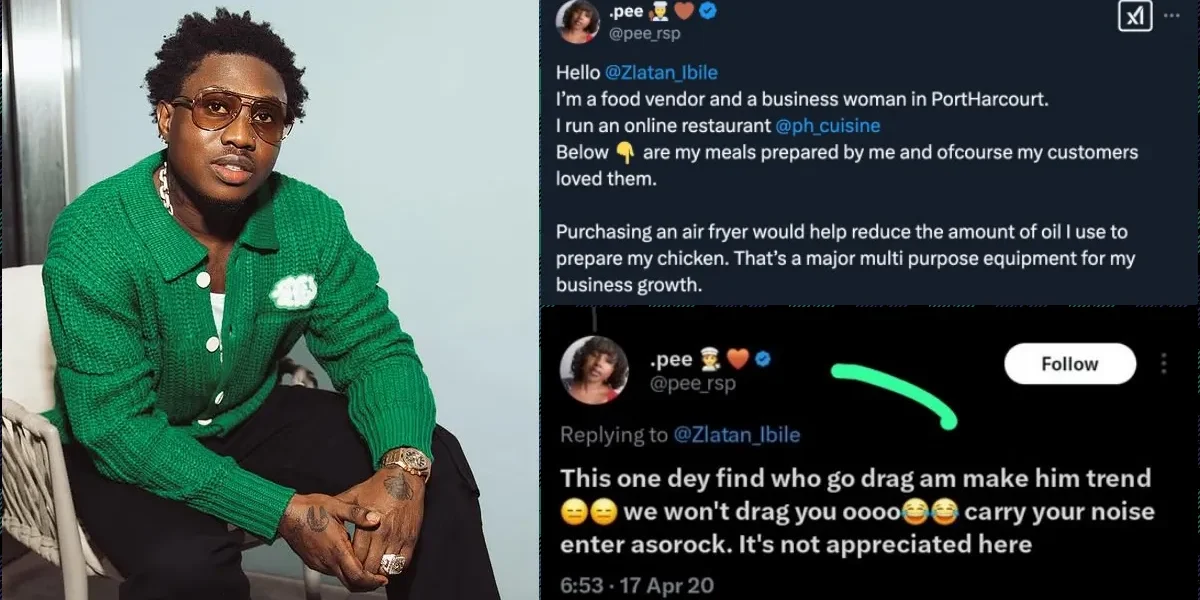A young Nigerian vendor has found herself at the center of a social media storm after losing out on a generous giveaway from singer Zlatan Ibile. The incident, which highlights the double-edged sword of online presence, began when Zlatan announced a campaign to support small business owners by gifting them N500,000 each. However, before transferring the funds to one selected beneficiary, the musician stumbled upon an old tweet in which she had mocked him during his early career struggles. This discovery led Zlatan to reconsider his decision, sparking widespread debate about forgiveness, accountability, and the lasting impact of digital footprints.
Zlatan Ibile, known for his vibrant music and entrepreneurial ventures, took to X (formerly Twitter) to announce a heartwarming initiative aimed at uplifting struggling entrepreneurs. In his post, he expressed admiration for individuals who consistently promote their work online despite limited resources. “This is for the dedication and hustle—if you’ve always shared or advertised your work or products on your timeline, this one’s for you,” he wrote. He added, “What does your small business need to thrive? How can I support you? I go check your timeline before I drop sha.”


The gesture resonated deeply with many Nigerians, especially those battling economic hardships. Thousands of hopefuls responded, sharing details about their businesses and aspirations. Among them was the young vendor whose posts caught Zlatan’s eye. Her relentless promotion of her goods stood out, earning her a spot among the beneficiaries.
Before sending the money, Zlatan followed through on his promise to review her past tweets—a routine step to ensure alignment with his values. It was then that he unearthed a problematic post from 2020. At the time, Zlatan had called out an influencer over a disagreement, prompting various reactions across social media. The vendor had joined the conversation, replying sarcastically: “This one dey find who go drag am make him trend. We won’t drag you ooo, carry your noise enter Aso Rock. It’s not appreciated here.”
While the comment may have seemed innocuous at the time, it carried undertones of ridicule directed at Zlatan during a period when he was navigating challenges in his budding career. Upon discovering the tweet, Zlatan humorously shared his predicament online, writing: “As I wan give I dey check wetin dem don tweet about me before, join. This one don enter me for 2020 and I don promise 500k. How we wan do am like this? 
His lighthearted tone did little to soften the blow for the vendor, whose dream of receiving financial support evaporated almost instantly. Instead of celebrating her selection, she became the subject of public scrutiny, with opinions sharply divided between empathy and judgment.
This episode serves as a stark reminder of the permanence of online content. Social media platforms offer unparalleled opportunities for self-expression and connection but also come with inherent risks. Once posted, words and images linger indefinitely, capable of resurfacing at inconvenient times. For the vendor, what started as a fleeting remark four years ago now threatens to overshadow her current efforts and achievements.
Critics argue that holding people accountable for past mistakes stifles growth and discourages redemption. They contend that everyone deserves a second chance, particularly if they have demonstrated improvement since their earlier missteps. Others, however, believe that public figures like Zlatan have every right to vet potential beneficiaries based on mutual respect and alignment with their principles.
Zlatan himself addressed the controversy in subsequent posts, emphasizing the importance of integrity and authenticity. While some praised his commitment to upholding these standards, others accused him of being overly harsh. Regardless of perspective, the situation underscores the complexities of navigating interpersonal relationships in an increasingly interconnected world.
For aspiring entrepreneurs and creatives, this incident carries valuable lessons. Building a personal brand requires careful consideration of how one presents oneself online. Every interaction contributes to shaping perceptions, influencing opportunities, and defining reputations. Aspiring business owners must strike a balance between authenticity and professionalism, ensuring that their digital personas align with their goals.
Similarly, artists and influencers face mounting pressure to maintain positive public images. Zlatan’s reaction reflects the evolving expectations placed on celebrities in today’s hyper-connected era. Fans often demand transparency while simultaneously expecting infallibility—a paradox that complicates interactions both online and offline. Striking this delicate balance remains a challenge for even the most seasoned professionals.
Social media users were quick to weigh in on the matter, generating heated discussions around themes of forgiveness, accountability, and justice. Some defended Zlatan, arguing that his actions were justified given the context of the original tweet. They pointed out that ridiculing someone during their lowest moments could leave lasting scars, making it reasonable for him to reassess his decision.
Others sympathized with the vendor, suggesting that her past comment should not disqualify her from benefiting from the giveaway. Many highlighted the socioeconomic realities faced by young Nigerians, where survival often takes precedence over diplomacy. They urged Zlatan to prioritize compassion over retribution, noting that the purpose of his initiative was to uplift rather than punish.
Amidst the debate, a few voices called for constructive dialogue, urging both parties to focus on moving forward positively. They proposed solutions such as offering guidance or mentorship instead of outright disqualification, allowing the vendor to learn from her mistake while still benefiting from Zlatan’s generosity.
Ultimately, this incident invites reflection on how society approaches conflicts in the digital age. While accountability is essential, so too is the capacity for empathy and understanding. People evolve, and their past actions should not necessarily define their futures. At the same time, public figures like Zlatan bear responsibility for setting examples through their decisions and behaviors.
For the vendor, the experience offers a painful yet potentially transformative lesson about the power of words and the importance of maintaining a respectful online presence. Moving forward, she has the opportunity to rebuild her reputation by focusing on her hard work and resilience, qualities that initially earned her recognition.
As for Zlatan, his handling of the situation will likely shape perceptions of his character and leadership. By fostering open communication and demonstrating flexibility, he can turn a contentious moment into an opportunity for growth—for himself, the vendor, and the broader community.



